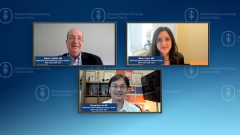
Clear Cell RCC: Testing Recommendations and Familial Risk
A brief discussion on the genetic risk tied to clear cell renal cell carcinoma and how that may inform familial risk and testing.
Episodes in this series

Transcript:
Robert J. Motzer, MD: One question we frequently get from the patients regarding clear cell RCC [renal cell carcinoma] is if it’s inherited. “Should I be seen by clinical genetics?” Maria, is there a certain population of patients who you would recommend get evaluated by clinical genetics? Are there any guidelines that we should use in terms of making that decision?
Maria I. Carlo, MD:I tend to follow the NCCN [National Comprehensive Cancer Network] Guidelines. In the kidney cancer guidelines, there’s a section on who should be considered for genetic counseling. Broadly speaking, it should be patients with a family history, with a first- or second-degree relative with RCC; multifocal RCC, which is more than 1 RCC during their lifetime; and young patients. For young patients, the cutoff used for by NCCN is 46 years old, because based on data from NCI [National Cancer Institute] showing that if you tested patients under age 46, that would capture most of those with an inherited syndrome.
[We take a] very careful family history, asking the patient certain questions to see if there’s nothing else indicative of a genetic syndrome. For example, and we recently published these data, [we look at] the rate of pickup for a genetic condition in a young patient with a clear cell RCC and nothing else—no family history, obviously no hemangioblastomas or something to make you think of VHL [von Hippel-Lindau syndrome], no other conditions—is very low. But I do discuss it with them. I offer it. It’s a good exercise for them to take a comprehensive family history with a generic counselor. I counsel that it’s probably unlikely they have something, but it’s a good idea to take a detailed family history. It may be that there’s some genetic yet undiscovered cause for why young people get clear cell kidney cancers.
Transcript edited for clarity.




































